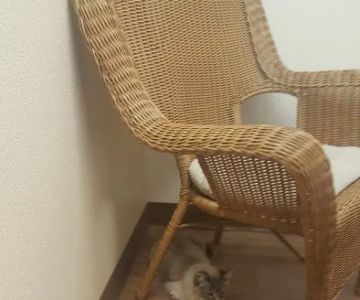Best Supplements for Cat Joint Health: A Guide to Keeping Your Feline Active
As a pet owner, it’s heart-wrenching to see your cat struggle with mobility or seem uncomfortable as they age. I’ve personally gone through the experience of watching my own feline companion slow down due to joint pain, which led me on a mission to find the best supplements for cat joint health. In this article, I’ll share everything I’ve learned about how to support your cat’s joints, reduce arthritis symptoms, and keep your furry friend comfortable and active for years to come.
1. Why Joint Health is Important for Cats
When my cat, Max, started having difficulty jumping onto the couch or climbing stairs, I knew something was wrong. Like many older cats, he was developing arthritis, a common condition that affects feline joints. Arthritis is a progressive condition that can cause pain and inflammation, reducing a cat's mobility. Just like humans, cats experience joint issues as they age, making joint health a crucial aspect of their overall well-being.
1.1 The Signs of Joint Pain in Cats
Joint pain in cats isn’t always easy to spot, as they are very good at hiding discomfort. However, there are some telltale signs to watch out for. These include difficulty getting up, reduced activity levels, limping, and an unwillingness to jump or climb. If your cat is showing any of these symptoms, it might be time to consider supplements that support joint health.
2. Best Supplements for Cat Joint Health
After doing extensive research and consulting with our vet, I found several supplements that can help support my cat's joint health. Here are some of the top recommendations based on their effectiveness and the positive impact they’ve had on Max’s mobility:
2.1 Glucosamine
Glucosamine is one of the most commonly recommended supplements for joint health in cats. It helps build and repair cartilage, which is essential for joint function. When Max started taking glucosamine supplements, I noticed a gradual improvement in his ability to move around. This supplement works by reducing inflammation in the joints and providing essential nutrients that aid in the repair of damaged cartilage.
2.2 Chondroitin
Chondroitin often works in tandem with glucosamine to provide enhanced joint protection. This supplement helps prevent the breakdown of cartilage and encourages the production of more. I’ve seen several positive reviews of chondroitin-rich supplements, with many cat owners reporting increased mobility in their pets. It’s particularly helpful for cats suffering from arthritis, as it helps keep the joints lubricated and functioning smoothly.
2.3 Omega-3 Fatty Acids
Omega-3 fatty acids, especially EPA and DHA, are well-known for their anti-inflammatory properties. In Max’s case, incorporating omega-3s into his diet helped reduce inflammation in his joints. Omega-3s can be found in fish oils, and many supplements designed for cats include these essential fatty acids. I recommend looking for omega-3 supplements that are specifically formulated for cats, as they often contain the right balance of nutrients for your pet’s needs.
3. Natural Joint Support for Cats
While supplements can provide great benefits, natural alternatives can also play a key role in supporting joint health. I’ve found that certain herbs and foods can help manage joint pain and inflammation naturally. Here are a few natural options that worked well for Max:
3.1 Turmeric
Turmeric is a powerful anti-inflammatory herb that’s been shown to reduce pain and swelling. Some pet owners swear by adding turmeric to their cat's food to support joint health. I’ve personally used turmeric powder in Max’s meals, and although I didn’t see overnight results, over time, I noticed he seemed more comfortable and active. Just be sure to consult your vet about the proper dosage for your cat.
3.2 Green Lipped Mussel
Green-lipped mussel, often used in both human and animal joint supplements, is another excellent natural remedy. This shellfish is rich in omega-3s and glycosaminoglycans, which help reduce inflammation and promote joint repair. I’ve found that green-lipped mussel supplements can be particularly effective for older cats with arthritis or joint degeneration.
4. How to Choose the Right Supplement for Your Cat
When choosing a supplement for your cat’s joint health, it's important to consider a few key factors. I’ve learned through trial and error that not all supplements are created equal, and it’s crucial to choose high-quality products. Here are some tips I’ve found helpful when selecting a supplement:
4.1 Consult with Your Veterinarian
Before starting any supplement regimen, it’s important to talk to your vet. They can recommend the right dosage and help you select the best product based on your cat's specific condition. I made sure to discuss Max’s health concerns with our vet, who guided me on the best options available.
4.2 Choose Reputable Brands
Not all supplements are made the same. I recommend choosing products from reputable brands that specialize in pet health. Look for supplements that are made with high-quality ingredients and have undergone testing for safety and efficacy. Avoid generic, low-cost supplements that may not provide the full benefits you need.
4.3 Look for Supplements with Added Benefits
Some joint supplements offer additional benefits such as improved skin health, enhanced coat shine, or better digestion. These added benefits can make a difference in your cat’s overall well-being, so look for products that provide multiple advantages in one.
5. Monitoring Your Cat's Progress
Once you start your cat on a supplement, it’s important to monitor their progress closely. I kept track of Max’s activity levels, how he was moving, and any changes in his behavior. I noticed that after a few weeks, he seemed more energetic, and his joint pain appeared to be reduced. It’s also essential to keep up with regular vet visits to ensure your cat is getting the right care and treatment for their joint health.











